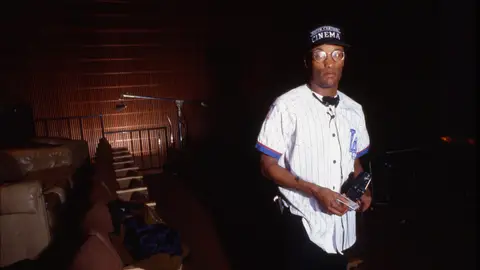John Singleton's Films Weren't Just Necessary — They Were Revolutionary

By Melissa Kimble
In the spring of 1991, the police beating of Rodney King sparked a flame in the city of Los Angeles. The violent display of brutality was caught on camera — a powerful and virtually unprecedented piece of evidence at the time — but ultimately resulted in the acquittal of the four accused police officers who were involved. The following year, L.A. finally caught on fire. A series of events known as the Los Angeles riots catapulted the city's racial divides to the forefront of the national conversation but did so in a way that disregarded Black life, exacerbated discrimination, and caused L.A. to spin out of control. In the middle of these two critical moments of Black history lies John Singleton’s explosive debut film, Boyz N The Hood.
At 22 years old, the USC grad examined Black life beyond the media’s portrayal of it. Black communities weren’t simply war zones, consisting only of drugs, violence, and hopeless victims of their circumstances with no dreams, values, or ambition. Inspired by rap group N.W.A., Singleton's Boyz N The Hood was a testament to his biggest creative influences: hip-hop, Eazy-E, filmmaker Spike Lee, and the city of Los Angeles.
His work would go on to set the stage for films as form of activism, highlighting the everyday realities of Black people in America — and opened the doors for the works of Black filmmakers who followed him like Ava DuVernay, Lena Waithe, and Barry Jenkins.
DuVernay credits Singleton among those who helped pave the way for voices like hers.
"There aren’t many of us out here doing this. It’s a small tribe in the grand scheme of things,” she shared in the filmmaker’s memory following his death on April 29. "He was a giant among us. Kind. Committed. And immensely talented. His films broke ground. His films mattered."
And these films broke ground in more ways than one. Singleton's work represented the underrepresented. He embraced hip-hop and its stars, giving big-screen opportunities to controversial artists like Ice Cube and Tupac Shakur. Both rappers had been targets of politicians and the media who felt their music glorified guns and drugs — even MTV banned N.W.A.’s "Straight Outta Compton" video. Both of their roles in Singleton’s work signaled new ground for the rappers themselves and showcased how rap and hip-hop were inherently political, rather than just a vehicle for violence.
[L to R] Eddie Murphy, John Singleton, and Ice Cube attend the first annual MTV Movie & TV Awards
There’s a direct connection between hip-hop and the plight of the Black community. Singleton used hip-hop music and the talents of its artists for his own activism. And in many ways, he acted as a mentor to them and other young Black actors. "He not only made me a movie star but made me a filmmaker," Ice Cube said following Singleton's death.
And that concept of mentorship is important, especially for Black creatives.
"I have a ton of mentees," Lena Waithe, who thanked Singleton for his guidance in a remembrance posted to Instagram, told Vanity Fair last year. "They’re all people of color. Some of them are poor. And I’m just trying to help them learn how to be great writers; and for those that have become really good writers, I help them get representation; and those that have representation, I want to help get them jobs. That to me is a form of activism."
His work allowed young Black men and women to break the negative stereotypes of what Black youth were about. Moonlight, directed by Barry Jenkins — who described Singleton’s untimely passing as “cruel” — is a coming-of-age drama for a new generation of Black boys, but undoubtedly shared the same principle that Singleton had while directing his own tale: that Black boys’ stories deserve to be told. Still today, Black boys are suspended three times as much as white boys and Black girls six times as much as white girls. Likewise, Black youth are five times more likely to end up in a juvenile facility than white youth. Singleton’s message remains loud as ever.
John Singleton allowed Black people, Black youth in particular, to be displayed as fully-realized individuals who weren’t simply victims of their circumstances; they were working to overcoming the systems set in place for Black people to fail. It was bigger and brighter than anything the media at that time could understand. Lucky in Poetic Justice (Tupac Shakur) wasn’t just an angry soul who hated his job, he was a young man who sought to pursue success with his family in tow. And Higher Learning's Malik (Omar Epps) wasn’t just a fortunate kid who had to go to college, he was a young student discovering his place in greater society.
During one of the most violent times in country’s history, seeing their humanity wasn’t just necessary, it was revolutionary.





